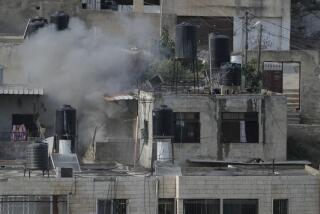Troops Seize Scores of Youths in Nablus : Israel: The biggest operation of its kind appeared aimed at breaking the back of the city’s uprising.
- Share via
NABLUS, Israeli — Occupied West Bank--Hundreds of Israeli soldiers Saturday carried out raids in Nablus, an urban hotbed of Palestinian unrest, arresting scores of youths and searching dozens of homes. It was the biggest operation of its kind during the two-year Arab uprising in the occupied territories.
The raids followed by a day the killing by Israeli troops of four members of a Palestinian assassination squad known as the Black Panthers. The squad, composed of young men wanted by Israeli authorities, was notorious for murdering Arabs suspected as informers or Israeli collaborators.
Troops in plainclothes spearheaded Friday’s action, opening fire on a barbershop in the old inner city of Nablus. A barber who did not belong to the Black Panthers was among five people wounded, Palestinian sources said.
Saturday’s raids appeared aimed at breaking the back of the uprising in Nablus, which is the West Bank’s largest and most militant anti-Israeli city. Unrest that was once confined to the stone alleyways of the Old City has spread up the biblical slopes of the Mountain of Curses on one side and Mountain of Blessings on the other.
“I believe that in the future it will be quiet in this area,” said Gen. Yitzhak Mordechai, the Israeli West Bank commander who directed the raids.
Since the uprising began in December, 1987, more than 100 Palestinians have been killed by Israeli action in Nablus.
Soldiers began pouring into the city at 4 a.m., splitting into groups of about 200 each and fanning out to perhaps a dozen neighborhoods. About 90 white Ford Escorts, the emblem vehicle of the Shin Bet, Israel’s domestic intelligence agency, also drove into town.
Green army trucks roamed the streets with loudspeakers blaring a warning to residents to be calm. “Terrorist groups have been disturbing you. We are here to get rid of them,” the announcements said.
As the morning wore on, hundreds of blindfolded youths were trucked or walked into a plaza in front of the city’s tallest building. Dozens of others were interned at the military headquarters at the northern entrance to Nablus.
Troops collected masks, axes, knives and other items that could be used as weapons.
Several residents complained that soldiers went on rampages during searches, overturning furniture and rifling drawers. One man was arrested for having copies of Al Bayader Assiyasi, a moderate Palestinian political publication. Others were detained for having large kitchen knives in their possession.
There were no immediate reports of injuries.
The killing of the Black Panther members was carried out by Cherry, a special Israeli military unit used to track down wanted Palestinians, military sources said. The same unit earlier carried out a raid on members of the Red Eagles, another Palestinian death squad that specialized in killing suspected collaborators. In that assault, one Palestinian was killed and four were arrested.
In both cases, the Israelis disguised themselves as Arabs. They wore kaffiyehs , the traditional cloth headdress, and rode in cars bearing the blue license plates required of West Bank drivers.
For the past year, Israel has waged a secret war on Palestinian militants. Soldiers and Shin Bet agents have carried out numerous ambushes of stone throwers. Once, in Bethlehem, soldiers disguised themselves as tourists, shooting and killing a stone thrower.
As killings of collaborators increased in number during the summer and fall, Israeli attention has turned to wiping out Palestinian hit squads, notably in Nablus. Some of the members of such squads carry weapons.
“I don’t think there are too many groups holding arms,” said Gen. Mordechai. “But it’s enough that there are just a few--if they try to use them, it can make a lot of problems in the areas.”
The killing of the Black Panthers set off small riots in Nablus and in the faraway Gaza Strip as well.
In the Gaza Strip, soldiers shot and wounded at least 30 Palestinians on Saturday and placed a curfew on the town of Rafah and its adjacent refugee camp.
Publicly, Palestinian leaders were of two minds regarding the Black Panthers and Red Eagles. On the one hand, they considered the unbridled killing of suspected informers and criminals as soiling the moderate image of the uprising.
“The hit squads became the judge, jury and executioners, and there was bound to be abuses,” a Palestinian journalist said.
On the other hand, Palestinian leaders recognized that while Israel continued to hunt down hard-core street activists, it would be hard to rein in the violent groups. Until the killing of collaborators became epidemic in the summer, the Palestine Liberation Organization and local leaders of the uprising had taken responsibility for the slayings and viewed them as necessary housecleaning.
Recently, both the Black Panthers and Red Eagles rejected calls from PLO Chairman Yasser Arafat to stop the killing. The Panthers were affiliated with Fatah, the main PLO faction under Arafat’s control; the Eagles had ties to the Popular Front for the Liberation of Palestine, a Marxist-led PLO faction.
In an interview on Israel Television on Friday, a jailed member of the Red Eagles said, “All due respect to (Arafat), but he doesn’t know the situation here.”
The youth, 17-year-old Jabber Hawash, admitted carrying out eight murders, including the axing of his own cousin, a middle-aged woman. The Red Eagles had interrogated 140 suspects and used torture and beatings to get answers, he said.
“If we stop the killing, what can we do here, just sit around?” he asked.
Even as Jabber’s words were broadcast on television, Israel Radio reported that inmates of the Ketziot prison camp in the Negev desert killed a fellow inmate suspected of informing for the Israelis.
More to Read
Sign up for Essential California
The most important California stories and recommendations in your inbox every morning.
You may occasionally receive promotional content from the Los Angeles Times.










